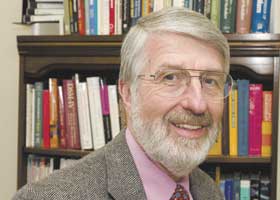  |
| HOME | THIS ISSUE | CALENDAR | PATENTS | BACK ISSUES | < BACK | NEXT > |
Health Center researcher studies alcohol, marijuana addictionby Pat Keefe - April 24, 2006 |
||||
|
Psychiatry professor Ronald Kadden has developed his professional portfolio through the study of alcoholics and alcoholism and chronic pot smokers. He also has a decade’s clinical experience running the Health Center’s Alcohol and Drug Abuse Treatment Center. His next research project, a collaboration with three Health Center substance abuse researchers, builds on many of the findings he’s documented over the years. One of the most important variables in substance abuse treatment success, he says, is not a specified treatment protocol, but rather the patient’s self-efficacy – the belief that he or she has the ability to make changes and engage in activities that help keep him or her sober. The research is funded by a five-year, $2.8 million grant from the National Institute of Drug Abuse. Kadden will collaborate with Mark Litt, a professor of oral health and diagnostic science, who made the initial observation; Nancy Petry, a professor of psychiatry; and Elise Kabela-Cormier, a research associate, to test the idea. The project is the latest in a career’s worth of research for Kadden, a Hartford native, who joined the Health Center in 1980 as a researcher and deputy director, then director, of the Alcohol and Drug Abuse Treatment Center. Together with Health Center researcher Ned Cooney, and faculty colleagues at Brown University, he developed a cognitive behavior manual for treating alcohol dependence. The manual focuses on training and development of skills that provide alternate ways of coping with situations in which the client is most likely to drink. The manual is widely used and has been translated into several foreign languages. It also has been adapted for use with marijuana-dependent patients. Kadden’s studies in alcohol treatment showed that training in different coping methods was effective for those alcoholics harboring anti-social tendencies and those with severe psychiatric problems. The bottom line was the identification of the importance of coping skills for improving alcoholism treatment outcomes. His marijuana research provided evidence that “pot” was considerably more addictive than people thought: the chronic users who came for treatment were really struggling to quit, and couldn’t do it on their own. They needed help. He continues to conduct research on the best ways to find help for chronic marijuana users and promote abstinence.
Kadden did his undergraduate and graduate work at Columbia University. Unlike many doctoral candidates in clinical psychology, Kadden concentrated on research and took only the minimum of clinical training. Doctorate in hand and after several years of experience, however, he decided to pursue the clinical training he needed to receive his clinical license. “It took me a long time to catch up clinically,” he says, “but I gained a strong research background.” As a substance abuse researcher, he has participated in two national cooperative studies: one on alcohol treatment, and the other on marijuana dependence. The alcohol study determined which treatment or combination of treatments worked best for people with severe psychological problems, chronic anger, those whose environment was supportive of drinking, and those with a greater degree of alcohol dependence. The marijuana study found that enhancing patients’ motivation and training them in coping skills during therapy sessions was the most effective treatment for pot addiction. These results indicate the potential benefit of screening and early intervention for marijuana problems in various clinical settings. His research is complemented by his work as chairman of an Institutional Review Board. That experience allows him to meet other researchers, explore ethical issues and challenges, and make sure planned investigations do not put patients at unreasonable or unintended risk. “I enjoy the interplay of research and clinical experiences,” he says, “and I enjoy teaching and sharing my experiences with medical students and residents.”
|
| ADVANCE HOME UCONN HOME |

